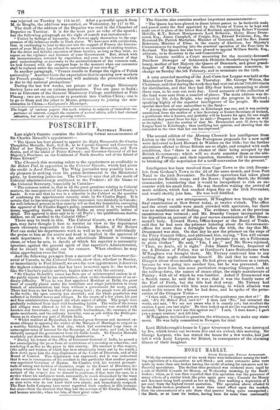POSTSCRIPT.
SATURDAY NIGHT.
Last night's Gazette contains the following formal announcement of Sir Charles Metcalfe's appointment-
" The Queen has been pleased to appoint the Right Honourable Sir Charles Theophilus Metcalfe, Bart., G.C.B., to be Captain-General and Governor-in Chief of her Majesty's Provinces of Canada, New Brunswick, and Nova Scotia, and of the island of Prince Edward ; and Governor-General of all her Majesty's Provinces on the Continent of North America and of the Island of Prince Edward."
The Chronicle this morning refers to the appointment as creditable to Sir Robert Peel, in opposition to the Colonial Gazette, which had given the credit to Lord Stanley. The Whig journalist may possibly have a sly pleasure in making even his praise detrimental to the Ministerial party, by fostering jealousies. The Chronicle says that all the merit of Colonial administrationjs attributed to the Premier ; all the blame to the Colonial Secretary,'"especially in Canada- " The common notion is, that in all the great questions relating to Colonial matters, the management of his own department is taken out of Lord Stanley's hands. It was said that he was in a minority in the Cabinet on the question of confirming the appointments recently made by Sir Charles Bagot. It is certain that he has managed to create this impression very decidedly in Canada; for well-informed persons in that country tell us that the despatches, conveying the approval of Sir Charles Bagoes policy, communicated it in very qualified terms, suggesting doubts, and hinting dislike, on every possible matter of detail. The approval is there said to be all Peel's'; the qualifications, doubts, &likes, are all ascribed to the Colonial Office."
There may be truth in this. The Colonial Gazette, as a Colonial or- gan, may have thought it best to restrict its view to the department more obviously responsible to the Colonies. Besides if Sir Robert Peel can make his departments work as well as he would individually the praise to him as the centre and head is implied in the approval of each department. It is when the subordinate Minister is contuma- cious, or when he acts, in details of which his superior is necessarily ignorant, against the general spirit of that superior's Administration, that he should be singled out for censure. When obedient, he may claim approbation even for that.
And the following passages from a memoir of the new Governor-Ge- neral of Canada, in the Colonial Gazette, show that, whether to Stanley, or immediately to Peel himself, we owe the new appointment, it deserves the highest commendation that has been bestowed upon it : the review, like Sir Charles's public service, begins almost with the century. "Sir Charles Metcalfes career has been one of uninterrupted success in al the public objects that he has undertaken, often under circumstances of no or- dinary difficulty. When he was first appointed Resident at Delhi, the great tract of country placed under his immediate and single jurisdiction in every branch of administration bad been without a government for many years. There had been no law but that of the strong hand ; the people were all armed to the teeth; the open country was deserted ; and the whole population was collected in fortified towns and villages. In the course of a few years, his just and firm administration changed the whole aspect of affairs. The people were gradually reclaimed from their wild freebooting habits. The walls of the towns and villages were allowed to fall to decay. The country was studded with hamlets and farmsteads ; and the peaceable husbandman, the caravans of the grain-merchants, and the ordinary traveller, were as safe within the Delhi pro- vinces as in almost any part of British India. • • "Whilst resident at Hyderabad, be showed great firmness and incurred ex- treme obloquy in opposing the wishes of the Marquis of Hastings in respect to i a wealthy banking-firm n that city, which bad contracted large loans at extravagant rates of interest for the Sovereign of that state, and had, in fact, virtually usurped the government from his feeble hands. Sir Charles Metcalfe
resolutely put down this money-lending domination. • •
"During his tenure of the office of Governor-General of India, he passed a law emancipating the press from all restrictions of censorship or otherwise, and rendering it as free as the press in this country. His conduct in this respect, (the safety and wisdom of which has been abundantly borne out by the result,) th•ew down upon him the deep displeasure of the Court of Directors, and of the Board of Control. This displeasure was expressed; and it was understood that it was in consequence of his conduct in this particular that another person was appointed Governor of Madras. Sir Charles, with his wonted prompti- tude of acting and decision of character, wrqte to the Court of Directors, in- quiring whether lie had lost their confidence; as it did not comport with his notions of the respect due to himself to continue, if that were the case, in a service where Ids usefulness must, necessarily, be much diminished by the want of the countenance of his employers. He received an equivocal answer, such as men write who do not know their own minds; and immediately resigned. The East India Company have never regretted their conduct in this instance but once—from the moment that they lost the services of Sir Charles Metcalfe, and became sensible, when too late, of their great value."


























 Previous page
Previous page